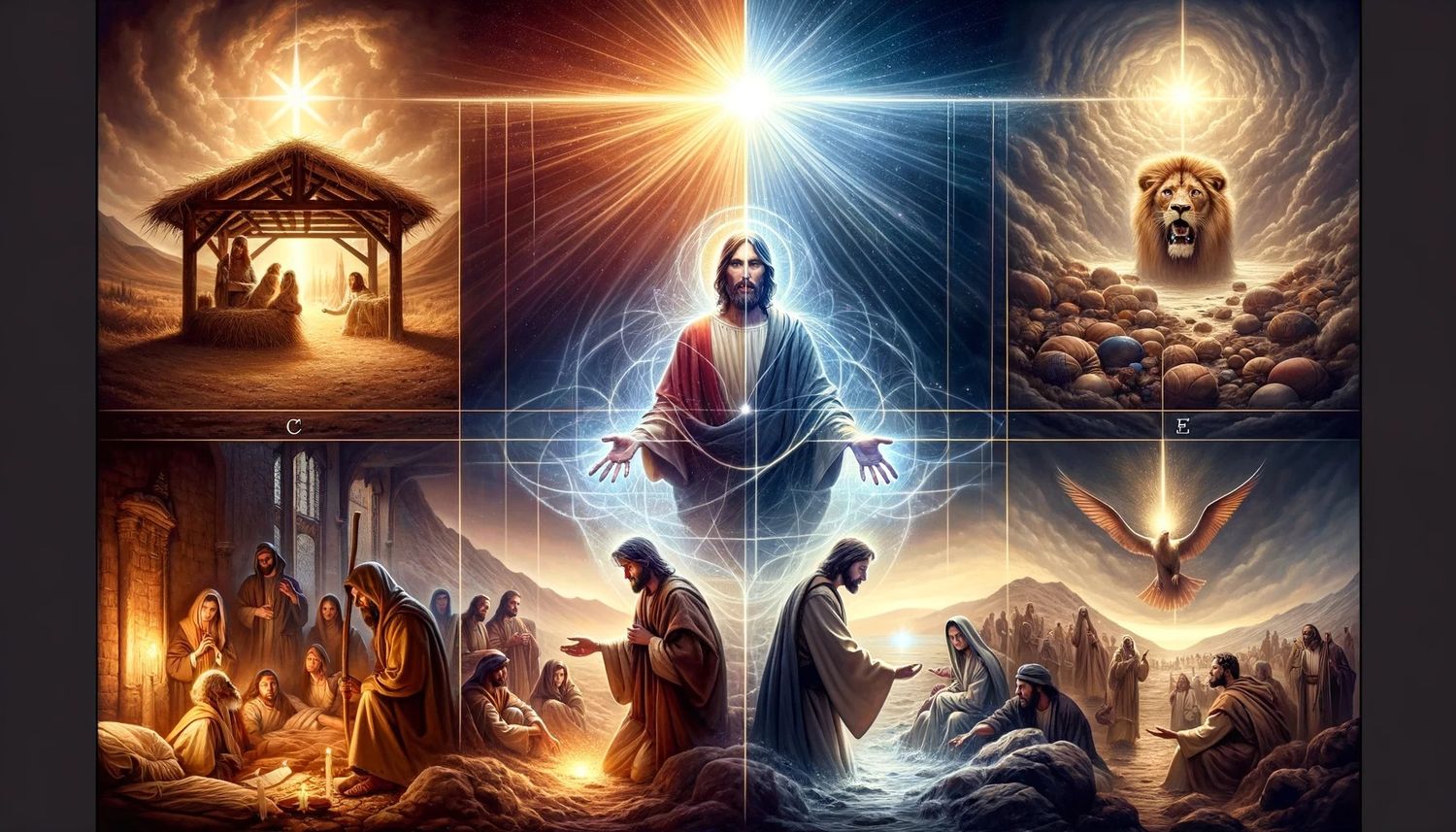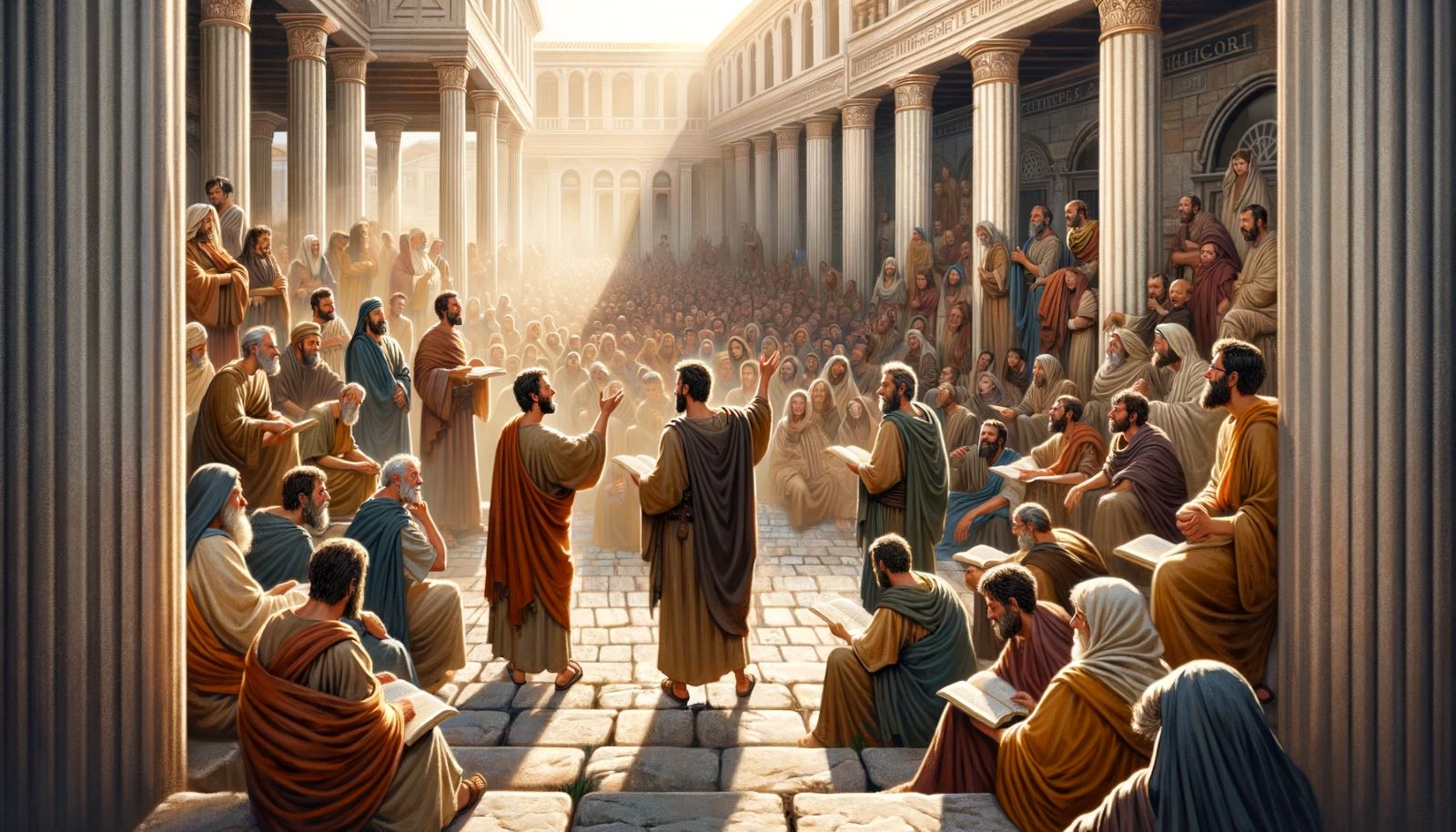Home>Christian Videos>Bible Stories>What Do The Gnostic Gospels Teach


Bible Stories
What Do The Gnostic Gospels Teach
Published: March 7, 2024
Ericka Andersen, an editor at Christian.net, expertly merges digital strategy with content creation, focusing on faith and societal issues. Her communication skills enhance the platform's engaging narratives, fostering meaningful dialogue on belief's impact on society.
Discover the hidden teachings of the Gnostic Gospels and their unique perspectives on biblical stories. Uncover a new understanding of the Bible with these ancient texts.
(Many of the links in this article redirect to a specific reviewed product. Your purchase of these products through affiliate links helps to generate commission for Christian.net, at no extra cost. Learn more)
Table of Contents
Introduction
What do the Gnostic Gospels teach? The Gnostic Gospels offer a unique perspective on early Christian beliefs and spirituality. These ancient texts provide insights into the diverse and complex landscape of early Christianity, shedding light on alternative interpretations of Jesus' teachings and the nature of the divine. In this article, we will explore the origins, key teachings, the role of women, controversy, and the influence of the Gnostic Gospels today. Let's delve into the fascinating world of the Gnostic Gospels and uncover the wisdom they impart.
Read more: What Do Gospels Teach Us
The Origins of the Gnostic Gospels
The Gnostic Gospels are a collection of early Christian texts that were discovered in the 20th century, providing valuable insights into the diverse beliefs and practices of early Christian communities. These texts were not included in the canonical New Testament and were largely unknown until the discovery of the Nag Hammadi library in Egypt in 1945. The Nag Hammadi library, a collection of 13 ancient codices containing over 50 texts, including the Gospel of Thomas, the Gospel of Mary, and the Gospel of Philip, offered a new window into the rich tapestry of early Christian thought.
The term "Gnostic" is derived from the Greek word "gnosis," which means knowledge. The Gnostic Gospels reflect the beliefs of certain Christian groups that emphasized the importance of spiritual knowledge or insight into the divine realm. These texts were likely composed in the 2nd and 3rd centuries CE, during a time of theological diversity within early Christianity. The Gnostic Gospels present a different perspective on the life and teachings of Jesus, often portraying him as a revealer of hidden knowledge and a spiritual guide.
The origins of the Gnostic Gospels are closely tied to the broader context of early Christian diversity and the theological debates of the time. The discovery of these ancient texts has sparked renewed interest in understanding the complex and multifaceted nature of early Christianity, offering a fresh lens through which to explore the rich tapestry of Christian beliefs and practices in the ancient world.
The Key Teachings of the Gnostic Gospels
-
Salvation Through Knowledge: The Gnostic Gospels emphasize the concept of salvation through spiritual knowledge or gnosis. According to these texts, salvation is not solely attained through faith or good works but through a deep understanding of the divine realm and one's true spiritual nature. Gnosis is portrayed as a transformative knowledge that liberates individuals from the constraints of the material world and connects them to the divine source.
-
The Divine Spark Within: Central to the teachings of the Gnostic Gospels is the idea that each individual possesses a divine spark or a fragment of the divine essence. This concept underscores the belief in the inherent spiritual potential of every person and the possibility of reuniting with the divine through self-discovery and inner awakening.
-
The Illusion of the Material World: The Gnostic Gospels present a stark contrast between the material world, which is often depicted as a realm of illusion and suffering, and the spiritual realm, which is the true home of the divine. This dualistic worldview underscores the Gnostic emphasis on transcending the limitations of the physical existence and seeking a deeper, spiritual reality.
-
The Role of Jesus as a Spiritual Guide: In the Gnostic Gospels, Jesus is portrayed not only as a teacher and a savior but also as a revealer of hidden knowledge and a spiritual guide. His teachings are often presented as esoteric wisdom intended to lead his followers to a deeper understanding of their divine nature and the true nature of the cosmos.
-
The Divine Feminine: Some Gnostic texts also highlight the importance of the divine feminine principle, challenging the predominantly male-centered narratives of mainstream Christianity. The Gospel of Mary, for example, presents Mary Magdalene as a prominent disciple who receives special teachings from Jesus, elevating the role of women in the transmission of spiritual knowledge.
The key teachings of the Gnostic Gospels offer a thought-provoking perspective on the nature of spirituality, salvation, and the human-divine relationship, inviting readers to contemplate the deeper mysteries of existence and the potential for inner transformation.
The Role of Women in the Gnostic Gospels
The Gnostic Gospels offer a unique portrayal of the role of women in early Christian communities, challenging traditional gender dynamics and providing a platform for the expression of the divine feminine. Unlike the canonical New Testament, which often presents a predominantly male-centered narrative, the Gnostic Gospels feature women in prominent and influential roles, highlighting their spiritual significance and contributions to the spread of esoteric knowledge.
-
Elevating the Divine Feminine: The Gnostic Gospels elevate the divine feminine through the portrayal of female figures as recipients of profound spiritual teachings and wisdom. The Gospel of Mary, for instance, depicts Mary Magdalene as a close disciple of Jesus who receives secret teachings and insights into the nature of the divine. This representation challenges the marginalization of women in traditional Christian narratives and emphasizes their capacity for spiritual leadership and enlightenment.
-
Challenging Traditional Gender Norms: In contrast to the societal norms of the time, the Gnostic Gospels present women as integral participants in the transmission of spiritual knowledge and the embodiment of divine wisdom. These texts offer a radical departure from the prevailing patriarchal structures, providing a platform for the empowerment and recognition of women as bearers of sacred truths and spiritual insight.
-
Embracing Equality and Inclusivity: The Gnostic Gospels convey a message of equality and inclusivity, emphasizing the spiritual potential of both men and women. By featuring female characters as central figures in the narrative, these texts advocate for a more balanced and inclusive understanding of the divine, transcending the limitations of gender-based hierarchies and affirming the inherent spiritual equality of all individuals.
-
Reimagining Mary Magdalene: The portrayal of Mary Magdalene in the Gnostic Gospels differs significantly from her depiction in traditional Christian literature. Instead of being cast in a diminished or penitent role, Mary Magdalene is presented as a revered disciple who engages in profound dialogues with Jesus, challenging the conventional portrayal of her as a repentant sinner. This reimagining of Mary Magdalene underscores the Gnostic emphasis on the spiritual agency and significance of women in the early Christian movement.
-
Inspiring Contemporary Discussions: The representation of women in the Gnostic Gospels continues to inspire contemporary discussions on gender, spirituality, and the historical role of women in early Christianity. These texts provide a valuable resource for exploring alternative perspectives on the divine feminine and the contributions of women to the development of early Christian thought and practice.
The role of women in the Gnostic Gospels offers a compelling lens through which to examine the evolving dynamics of gender, spirituality, and religious leadership in the ancient world, inviting a reevaluation of traditional narratives and the recognition of the diverse voices that shaped early Christian traditions.
The Controversy Surrounding the Gnostic Gospels
The Gnostic Gospels have been the subject of significant controversy within the realm of Christian scholarship and theological discourse. The inclusion of these texts in discussions about early Christian beliefs and practices has sparked debates regarding their authenticity, theological implications, and their relationship to the canonical New Testament. Several key points contribute to the controversy surrounding the Gnostic Gospels:
-
Doctrinal Variance: One of the primary sources of controversy stems from the doctrinal variances between the Gnostic Gospels and the canonical New Testament. The theological perspectives presented in the Gnostic texts diverge from the orthodox Christian doctrines that form the basis of mainstream Christian theology. This variance has led to debates about the legitimacy of the Gnostic Gospels as authoritative sources for understanding early Christian beliefs.
-
Challenges to Orthodoxy: The Gnostic Gospels challenge traditional Christian orthodoxy by presenting alternative interpretations of Jesus' teachings, the nature of salvation, and the structure of the divine realm. These alternative perspectives have raised questions about the boundaries of acceptable Christian belief and the extent to which theological diversity was present in the early Christian communities.
-
Historical Context and Interpretation: The historical context and interpretation of the Gnostic Gospels have been sources of contention among scholars and religious authorities. Some argue that these texts provide valuable insights into the diverse landscape of early Christianity, offering a more nuanced understanding of the beliefs and practices that existed alongside the canonical traditions. Others, however, question the historical reliability of the Gnostic Gospels and their theological significance within the broader framework of Christian history.
-
Influence on Christian Thought: The potential influence of the Gnostic Gospels on the development of Christian thought and theology has been a point of debate. Some scholars argue that these texts played a significant role in shaping early Christian beliefs and should be considered alongside the canonical New Testament as valuable sources for understanding the diversity of early Christian thought. Others maintain that the Gnostic Gospels represent heterodox movements that deviated from the mainstream Christian tradition and should be approached with caution in interpreting their theological implications.
-
Modern Relevance and Interpretation: The contemporary relevance and interpretation of the Gnostic Gospels have also generated controversy. The impact of these ancient texts on modern Christian thought, spirituality, and religious discourse continues to be a topic of debate, with differing perspectives on their potential contributions to contemporary theological discussions and spiritual practices.
The controversy surrounding the Gnostic Gospels reflects the complex and multifaceted nature of early Christian history, theology, and the ongoing quest to understand the diverse expressions of Christian faith in the ancient world. These debates invite scholars, theologians, and believers to engage in critical dialogue about the significance and implications of the Gnostic Gospels within the broader context of Christian tradition and theological inquiry.
Read more: What Are The 4 Gnostic Gospels
The Influence of the Gnostic Gospels Today
The Gnostic Gospels continue to exert a profound influence on contemporary religious thought, spirituality, and theological discourse. Despite their ancient origins, these texts have sparked renewed interest and debate within academic circles, religious communities, and popular culture, shaping the way individuals engage with Christian history and the diversity of early Christian beliefs. The influence of the Gnostic Gospels today can be observed in several key areas:
-
Interfaith Dialogue and Comparative Religion: The Gnostic Gospels have become a focal point for interfaith dialogue and comparative religion, offering a unique perspective on the development of early Christian thought and its relationship to other religious traditions. These texts provide a bridge for exploring the intersections between Gnosticism, Christianity, and other spiritual movements, fostering a deeper understanding of the diverse religious landscape of the ancient world and its relevance to contemporary religious pluralism.
-
Spiritual Seekers and Alternative Christianity: The Gnostic Gospels have captured the imagination of spiritual seekers and individuals drawn to alternative forms of Christianity. The emphasis on inner knowledge, the divine spark within, and the esoteric teachings of Jesus resonates with those seeking a more mystical and introspective approach to spirituality. These texts have inspired the development of alternative Christian communities and spiritual practices that draw upon the Gnostic tradition as a source of inspiration and guidance.
-
Feminist Theology and Gender Studies: The portrayal of women in the Gnostic Gospels has contributed to the advancement of feminist theology and gender studies within religious scholarship. The recognition of the divine feminine and the prominent roles of women in these texts has sparked discussions about the historical contributions of women to early Christian thought and the reevaluation of traditional gender dynamics within religious traditions. The Gnostic Gospels have provided a platform for exploring the intersection of spirituality, gender, and religious leadership, inspiring new avenues of research and theological inquiry.
-
Literary and Popular Culture: The Gnostic Gospels have left an indelible mark on literary and popular culture, influencing artistic expressions, literature, and media representations of early Christian history. These texts have inspired works of fiction, scholarly publications, and artistic interpretations that seek to engage with the enigmatic and thought-provoking themes found within the Gnostic tradition. From novels to films, the Gnostic Gospels continue to captivate the imagination of creators and audiences alike, contributing to a broader cultural fascination with the mysteries of early Christianity.
-
Theological Reflection and Academic Scholarship: Within the realm of academic scholarship and theological reflection, the Gnostic Gospels have prompted rigorous inquiry into the diversity of early Christian beliefs and the theological implications of non-canonical texts. Scholars continue to explore the historical, cultural, and theological significance of the Gnostic tradition, shedding light on its potential impact on the development of Christian thought and the complexities of early Christian diversity. The Gnostic Gospels serve as a catalyst for ongoing research and critical engagement with the multifaceted nature of early Christianity.
The influence of the Gnostic Gospels today extends beyond the boundaries of traditional religious discourse, permeating diverse fields of study and cultural expressions. These ancient texts continue to inspire contemplation, dialogue, and creative exploration, inviting individuals to reconsider the rich tapestry of early Christian beliefs and their enduring relevance in the modern world.
Conclusion
The Gnostic Gospels offer a profound and multifaceted perspective on early Christian beliefs, spirituality, and the diverse landscape of theological thought in the ancient world. From their origins in the Nag Hammadi library to their portrayal of alternative interpretations of Jesus' teachings, the Gnostic Gospels continue to captivate the imagination of scholars, spiritual seekers, and individuals interested in the rich tapestry of Christian history. The role of women in these texts challenges traditional gender dynamics, while their influence today extends into interfaith dialogue, spiritual exploration, feminist theology, literary and popular culture, and academic scholarship. The controversy surrounding the Gnostic Gospels reflects the ongoing quest to understand the complexities of early Christian diversity and the theological implications of non-canonical texts. As these ancient texts continue to inspire dialogue, reflection, and creative engagement, they invite individuals to delve into the enigmatic world of early Christian thought and contemplate the enduring mysteries of the human-divine relationship.














